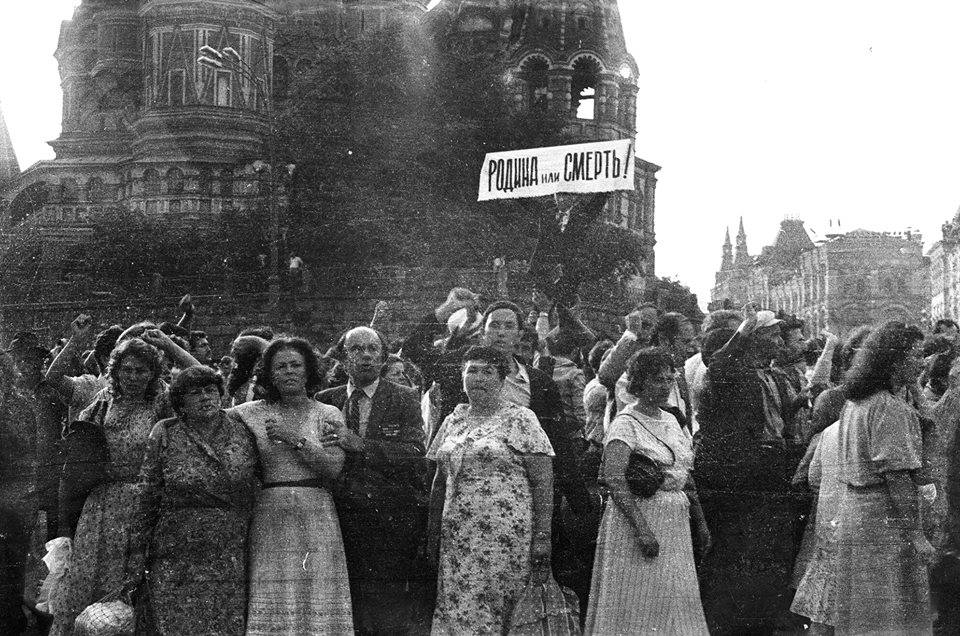In 1944, Crimean-Tatar people underwent total deportation from their homeland, and then, until 1989, they were forcibly held in places of exile.
Crimean-Tatar national movement, is the most massive one in the Soviet Union, in spite of the most severe repression and persecution by the communist regime, has always maintained a commitment to democratic values and the principle of non-violence, thus gained height influence and has made the return of the overwhelming majority of the Crimean Tatar people to their homeland – in Crimea.
One of the milestone events that preceded the mass and unauthorised by authorities of the USSR return of the Crimean-Tatar people to their homeland should be considered the loud and resonant protests of the Crimean Tatars on Red Square in Moscow in the summer of 1987.
The categorical refusal of the official authorities to return the people to their homeland (the commission of A.A.Gromyko) dispelled the last hopes even of those Crimean-Tatars who expected understanding from the state to restore their rights.
From that moment, hundreds and then thousands of families of Crimean-Tatars began to independently, contrary to the ban, leave their places of exile and return to Crimea.
In the same period (in the spring of 1989), the Crimean Tatar national movement underwent qualitative changes, uniting members of numerous initiative groups in the Organization of the Crimean-Tatar National Movement (OCNM).
(Mustafa Dzhemilev is elected as the Chairman of the OCNM).
In November 1989, the Supreme Soviet of the USSR adopted the Declaration “On the recognition of unlawful and criminal repressive acts against peoples subjected to forced resettlement, and ensuring their rights.” In the adoption of this document, a special role was played by the people’s deputies of the USSR, elected in the Baltic republics.
Since 1990, tens of thousands of Crimean Tatars began to return to Crimea annually. Such an initiative return was contrary to the plans of the official authorities who planned a “quota” return – no more than 5-7 thousand Crimean Tatars per year.
In June 1991, for the first time after 1917, the Crimean-Tatar people convoked a national congress – Kurultai, whose delegates were elected by Crimean-Tatars throughout the USSR. Soon, based on the decisions of the Kurultay and the Mejlis of the Crimean Tatar people that they elected, local and regional mejlises are elected in all administrative and territorial units of Crimea. Thus, in Crimea, the foundation was laid for the creation of a unique system of national self-government of the people returning to their homeland during the period of fundamental changes, marked by the collapse of the USSR and the creation of independent states
According to the approved procedures, elections of the Kurultay delegates were held every five years. The last election took place in 2013.
Due largely to the good self-organisation of the Crimean Tatar people, well-timed creation of a system of national self-government during the mass return of the Crimean Tatar people to their lands, Crimea managed to avoid open conflicts and confrontations between people.
Since the end of the 80s of the XX century and today, at the cost of tremendous personal efforts and losses, more than 300 thousand Crimean Tatars have returned to Crimea, most of which remain in the conditions of improving their living conditions.
The process of returning of the Crimean-Tatar people to their homeland has not been completed; the families are divided, and about 100 thousand Crimean Tatars are still forced to remain in places of exile. The CIS member states have withdrawn from fulfilling their obligations undertaken earlier under the Bishkek Agreement to facilitate the return of Crimean Tatars and their descendants to their lands, which creates new obstacles to their return.
So far, not a single law has been adopted aimed at restoring the political, economic, social and cultural rights of the Crimean-Tatar people.
It should be frankly acknowledged that the further delay in the restoration of the rights of the Crimean-Tatar people bears the catastrophic consequences that could lead to the loss by the human civilisation of one of the original and ancient peoples.
Realising its responsibility for the critical situation of the people and relying on its support, the Mejlis of the Crimean Tatar people came forward with the initiative of holding an International Forum on restoring the rights of the Crimean Tatar people in their homeland, ensuring its security and development.
Based on the fact that the international and European community cannot and should not remain indifferent to the ongoing tragedy of the Crimean Tatar people. A special International Forum should be convened under the auspices of international and European organisations on the issue of restoring the rights of the Crimean Tatar people in their homeland, ensuring its security and development.
Holding the International Forum under the auspices of the OSCE will maximise results that contribute to the elimination of the consequences of the genocide committed against the Crimean Tatar people and the totalitarian regime of the USSR.





